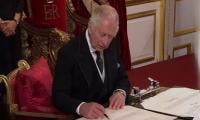ISLAMABAD: The government was asked in the Senate on Wednesday to give a fresh push to its political, diplomatic and legal options to expose India for furtherance of its political agenda, using religion, rape and abuse of human rights in Indian Occupied Kashmir and other parts.
Opposition senators also assailed the government for not being able to effectively respond to the situation, PM Modi’s Hindutva mindset had unleashed following his August 05 illegal, immoral and unconstitutional actions and hurling threats at Pakistan with regards to Azad Kashmir and Gilgit-Baltistan.
Taking part in the on-going debate, former Chairman Senate Mian Raza Rabbani noted that India was now Hindu fascist state, having said goodbye to Indian pluralism. “India thinks it has won Kashmir but it in fact has lost the soul of its secularism and democracy. By centralizing power and suppressing the claims of national minorities, India has dealt a blow to Indian federalism that held the state together,” he noted.
Rabbani contended that what New Delhi had failed to realize was that it had diversity of minorities, which include the Muslims, Buddhists, Christians, Sikhs and Jains, among others. He pointed out that there were a number of states with special status under Indian constitution: Assam, Arunchal Pradesh, Mizoram, Manipur, Nagaland and Sikkim while some others like Maharashtra and Gujarat had designated scheduled areas.
He noted that the story of Indian diversity being held together rested on strong democratic institutions, which now had been plagued by majoritarianism and opposition being subjected to calls of corruption thus making them defensive. “Thus federalism is being rendered subservient to Hindutva: an independent judiciary falling prey to Hindu nationalism, Indian secularism is drowning in the blood and screams of its Muslims and other minorities,” he regretted.
With this, he continued, the edifice of Indian state was eroding and the tide of Indian nationalism was not going to wash away the core issues that haunted the real India not the Bollywood India. He noted that in Indian Occupied Kashmir, courts had delayed hearing habeas corpus cases, decline to take up matters of mass detention and denied bail to opposition leaders.
Rabbani cautioned that the abrogation of Article-370 of Indian constitution, the weakening of Indian institutions and marginalization of the Muslims and other minorities had consequences beyond Kashmir.
Referring to the PTI government policy on the matter, he questioned why the government was silent on release of political leaders, withdrawal of Indian forces from Indian Occupied Kashmir and why it was shy of internationalizing the issue.
He emphasized, “Pakistan should talk frankly with its Muslim allies, particularly states like Saudi Arabia and UAE, which had massive business interests with India that we don’t want to dictate their national priorities. But surely the right of self-determination of a Muslim people, who are facing an abuse of their human rights is a question that should haunt the Muslim Ummah”.
Rabbani also recommended that Pakistan should call on OIC to exert collective pressure on India to end the lockdown that enters now 101 day and let a team of observers to assess the on ground situation in IOK and if OIC failed to respond then Pakistan should unilaterally suspend its membership of the organistion.
Pakistan, he suggested, should again raise the issue at UNSC and demand that UN observers be sent to IOK, as it was not only UN resolutions that had been violated by the abrogation of Article-370 but it continued to be violated as religion, rape and abuse of human rights were being used as a weapon to further the occupation of India on a territory, which was historically not its own.
PML-N Senator General ® Abdul Qayyum noted that the PTI government had ignored BJP’s manifesto and misjudged Modi’s intents. Besides, Pakistani government failed to approach UNSC against Indian violation of UN Charter article 2 (4), which says, “all members shall refrain in their international relations from the threat or use of force against the territorial integrity or political independence of any state or in any other manner inconsistent with purposes of United Nations.”
He pointed out that the failure of Indian proxy war against Pakistan, humiliating defeat in suppression of Kashmiri Indigenous struggle for independence, disgraceful ouster from Afghan peace process and successful completion of 1st phase of CPEC, added to Indian frustration, which resulted in the suicidal constitutional coup and a blatant aggression in Indian Occupied Kashmir (IOK).
Referred to Article 51 of UN Charter, which permits use of force against another country only in self defence or when UNSC so permits, he quoted UNGA resolution 37/43 which permits oppressed states like Kashmir even armed struggle for independence, territorial integrity, national unity and liberation against colonial domination and foreign occupation. “Besides, international humanitarian law additional protocol to Geneva Convention of 1949 permits this,” he added.
He called for adoption of a proactive diplomacy, pursue UNHCR reports of June, 2018 and July, 2019, work for national unity and economic revival, activate the National Action Plan, pursue CPEC, proactive use of media for Kashmir cause, revise national security strategy using all elements of national power to survive in unfair international system, relook at defence policy by the Parliament and finally give due respect to both houses of the Parliament.
MQM-Pakistan Senator Muhammad Ali Saif believed that Pakistan had a strong case to plead at global level and insisted that the government should move the International Court of Justice on the basis of human right abuses and not the violations of the international laws, keeping in view the world’s economic interests with India.
Likewise, the multi-national firms, he continued, which had invested billions of dollars in India, could be apprised of how it had been indulging in violation of human rights. He argued that the law of international intervention, being in practice for centuries, was also a potent option to pursue, as New Delhi had illegally made a territory its part after occupying it.
He pointed out that this very law was implemented in Armenia against Turks on the plea that the Armenian Turks were to be rescued. He recalled that in an interview to BBC in 1971, late Indian PM Indira Gandhi justified sending its troops to East Pakistan and attacking the West Pakistan as well on the plea that Pakistani forces were resorting to mass killings of Bengalese. She had said that the international laws and human right values forced her to help the Bengalese against Pakistan’s occupation forces.
“Whereas, factually speaking, Pakistani forces were defending their own territory and Mukti Bahini or Bengalese issues was our internal matter but India invaded East Pakistan and the world community supported it,” he said. He clarified that he did not mean that Pakistan should send its forces to Kashmir but extent full moral support to Kashmiris for their right to self-determination, as a conventional war could not be an option.







